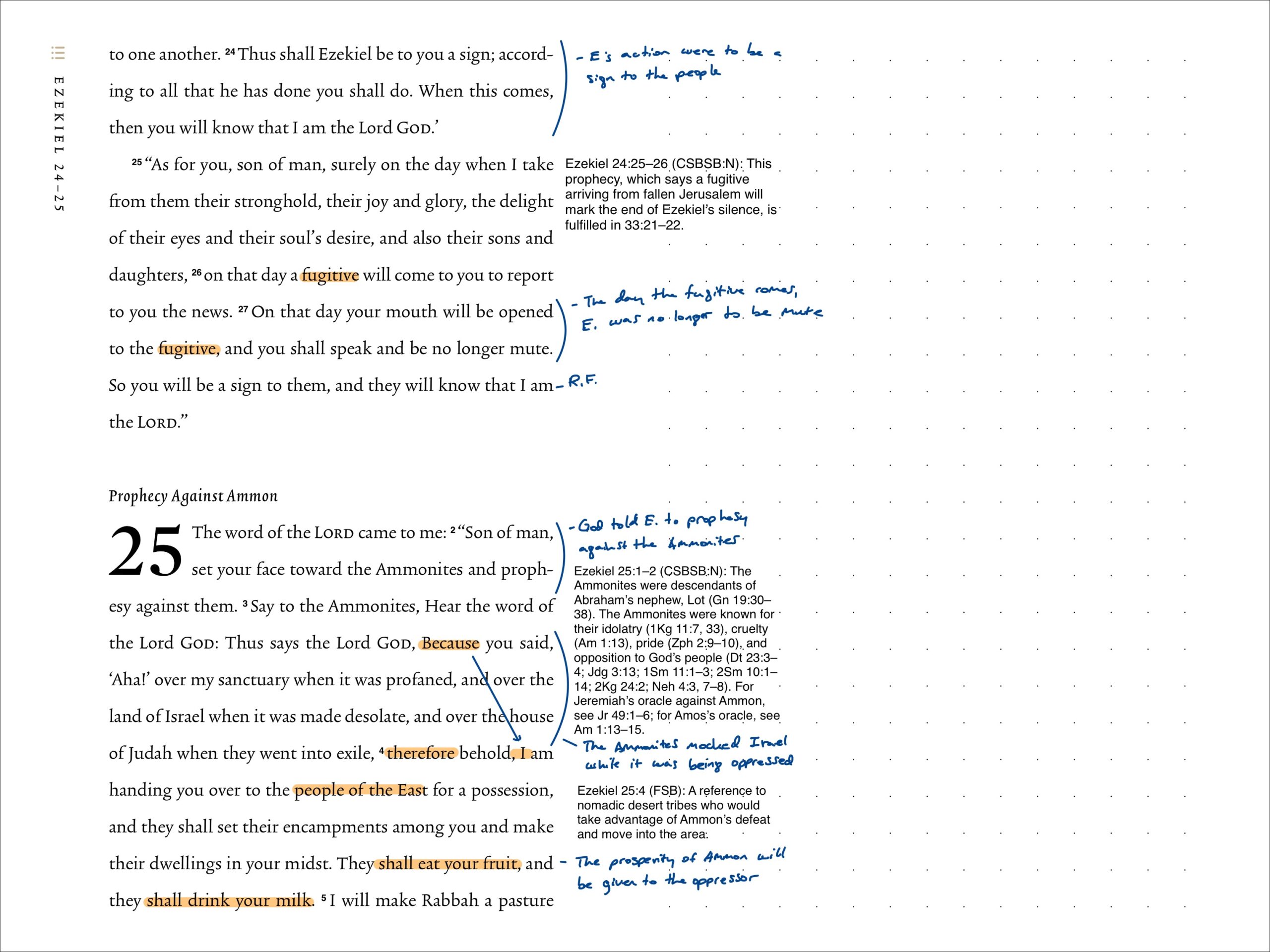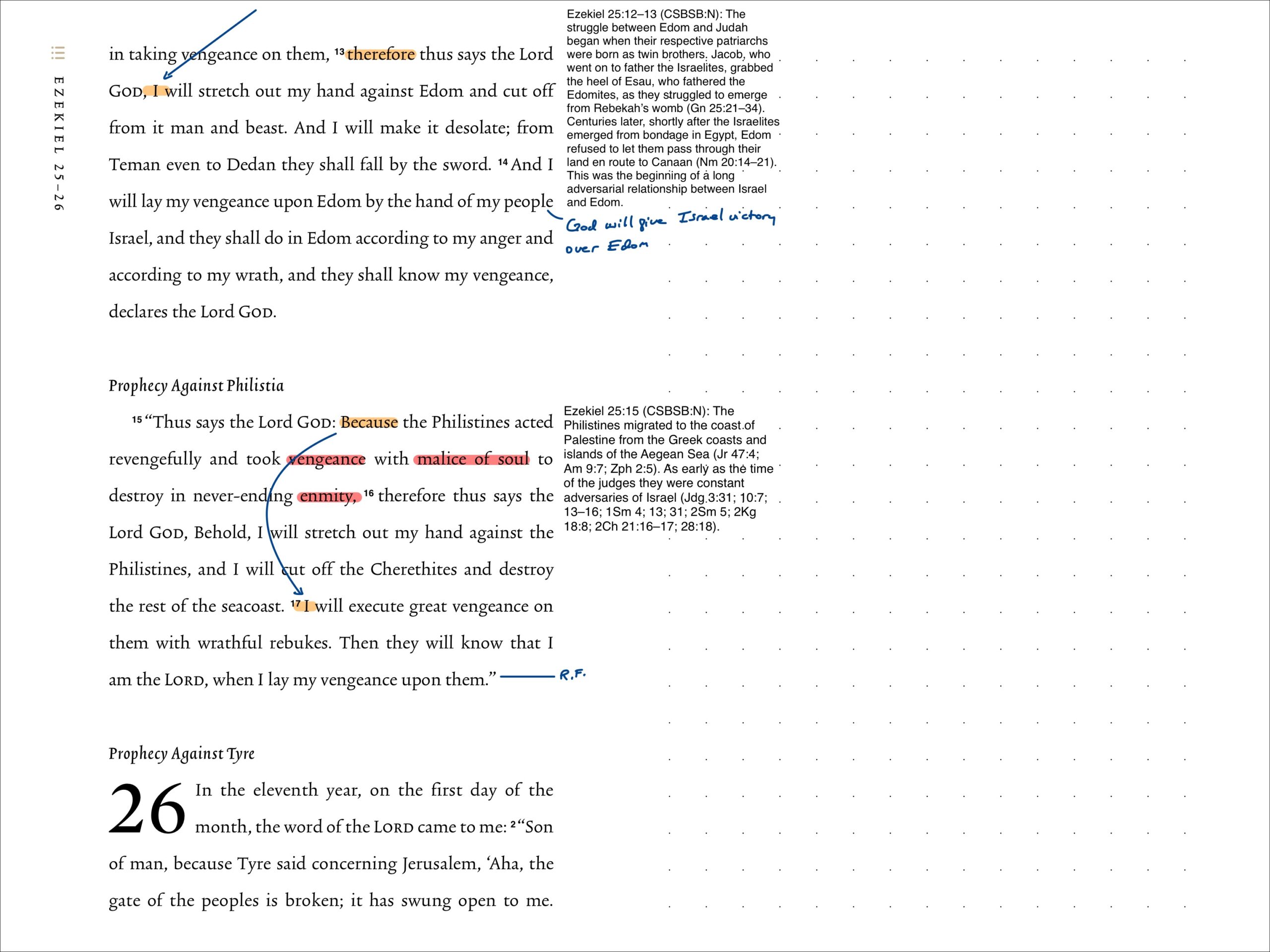| Date | Version | Reading Plan |
|---|---|---|
| @September 15, 2023 | ESV (2016) | ESV Prophets Plan 2023 |
Pericopes
- Prophecy Against Ammon
- Prophecy Against Moab and Seir
- Prophecy Against Edom
- Prophecy Against Philistia
Notes
The chapter opens with God telling Ezekiel to set his face against the Ammonites and prophesy against them. This is the first of several prophecies against lands and nations surrounding Israel. The Ammonites were descendants of Abraham’s nephew, Lot (Gen. 19:30–38). The Ammonites were known for their idolatry (1 Kings 11:7, 33), cruelty (Amos 1:13), pride (Zeph. 2:9–10), and opposition to God’s people (Deut. 23:3–4; Judges 3:13; 1 Sam. 11:1–3; 2 Sam. 10:1–14; 2 Kings 24:2; Neh. 4:3, 7–8). Jeremiah also prophesied against Ammon in Jer. 49:1–6 and Amos in Amos 1:13–15. Because the Ammonites mocked Israel while God’s sanctuary was being profaned, He will hand them over to the “people of the East” (Ezek. 25:4), a reference to nomadic desert tribes. God’s hand of judgment against Ammon will be very active, leading to full destruction.
In Ezek. 25:8-11, God tells Ezekiel to prophesy against Moab and Seir. The people of Moab were descendants of Lot and one of his daughters (Gen. 19:30-38). Shortly after Israel’s release from Egyptian bondage, the Moabites were the cause of great setback for Israel, introducing them to Baal worship (Num. 21:1-25; Num. 31:16). Moab and Seir would succumb to the same “people of the East” as the Ammonites (Ezek. 25:10).
Ezek. 25:12-14 is Ezekiel’s prophecy against Edom, the descendants of Esau. The struggle between Edom and Judah went as far back as Esau and Jacob. Centuries later, shortly after the Israelites emerged from bondage in Egypt, Edom refused to let them pass through en route to Canaan (Num. 20:14-21). God will now make Edom desolate and lay His vengeance upon them at the hand of His people, Israel (Ezek. 25:14).
The remaining verses (Ezek. 25:15-17) are of Ezekiel’s prophecy against Philistia who migrated to the coast of Palestine from the Greek coasts and islands of the Aegean Sea (Jer. 47:4; Amos 9:7; Zeph. 2:5). As early as the time of the judges they were constant adversaries of Israel (Judges 3:31; Judges 10:7; Judges 13–16; 1 Sam. 4; 1 Sam. 13; 1 Sam. 31; 2 Sam. 5; 2 Kings 18:8; 2 Chron. 21:16–17; 2 Chron. 28:18). They will now face God’s vengeance and, through it, come to know that He is the LORD (Ezek. 25:17).
Application
This chapter has several prophesies against Israel’s surrounding nations; first, with the Ammonites and then the Moabites, Edomites and finally the Philistines. They had all acted wickedly against either God or Israel (or both) and now God’s hand of judgment was upon them. And with each passing oracle, you see a pattern emerge that God says (in one way or another), “because…I”. For the Ammonites, It was because they mocked the people and said “’Aha’ over my sanctuary” that God said, “I am handing you over to the people of the East” (Ezek. 25:4). It was because Moab and Seir said that Judah was like the other nations that God said, “I will lay open the flank of Moab from the cities” (Ezek. 25:9) (emphases mine).
God’s wrath is never a rootless retaliation. It is always in response to some form of sin; the worshiping of other gods, the active thwarting of his rules and statutes, the mistreatment of His people, oppression of the poor, fatherless and widow and the like. God being perfect in love, holiness and righteousness reserves no allotment for sin. It cannot be in His presence. And so we, being born in trespasses and sins, following the desires of body and mind, are at enmity with God and children of wrath. Apart from supernatural intervention, our end is the very same as the nations to whom Ezekiel spoke.
This should make the news the gospel all the sweeter. That God, being rich in mercy and full of grace, has chosen to act. Christ came without sin to be sin on our behalf, covering us in His righteousness in order that we may have a path to the Father to celebrate and rejoice in Him forever. Let us be vivified in the love of Jesus today and of the wonderful work He has done.
Scripture Journal Notes
Commentaries & Resources Used
- ESV Study Bible. (Wheaton, IL: Crossway, 2008)
- Faithlife Study Bible (Lexham Press, 2016)
- Believer’s Bible Commentary (Thomas Nelson, 2016)
- CSB Study Bible Notes (Holman Bible Publishers, 2017)
- Matthew Henry’s Commentary on the Whole Bible (Guardian Press, 1976)
- The Bible: A Reader’s Guide (Sterling Publishing, 2011)
- The Infographic Bible (Zondervan, 2018)
- ESV Digital Scripture Journal (Crossway, 2019)


